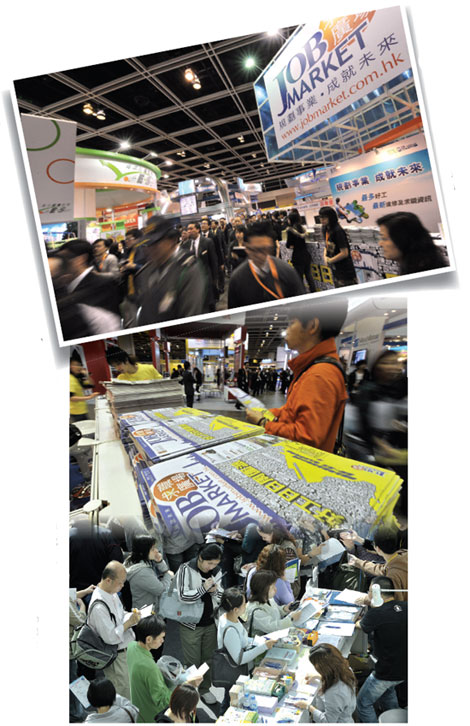Idyllic dreams fading for idle youth
Updated: 2013-01-17 06:03
By Ming Yeung(HK Edition)
|
|||||||
|
A woman looks at employment opportunities at a government job center in Hong Kong. An expert from Hong Kong Polytechnic University said the jobless problem among the city's youth is more structural than cyclical. In other words, the situation won't improve even when the economy prospers. Antony Dickson / AFP |
Young people between 15 and 29 are facing the toughest challenge among all workers today to find jobs. They are young, untrained, inexperienced and unemployed and have faint hope to take up their role as our future leaders when nobody wants to hire them and little is being done to change things. Ming Yeung reports.
Jason Yung kind of wishes he was born in Singapore. He's out of work for a year and can't even get an interview for a job opening. Oh, he has gotten a few interviews. But he's always walked away empty handed. It doesn't help when he reads that the jobless rate among youth in Singapore is about half the world's average - a lot better than it is in Hong Kong.
Meanwhile, Jason has appealed to friends, relatives, prowled the streets, prowled the Internet, applied for internships. Nothing materialized.
"I've tried every means to get a job. Every morning I hope for the best and every night I'm right back down again," says the dejected young man ruefully, speaking in his characteristic stutter. He lives with his father, who's 65 and retired not long ago. His mother? She's another story. She ran away when Jason was 10 and he hasn't seen her since. Father and son live on social welfare in a petitioned flat in Sham Shui Po.
Yung wasn't much of a scholar, hated studies, as can readily be seen from the column of straight F's on his exam certificate. He repeated Form Five twice and didn't get on very well with his classmates. He was too timid, too introverted. Even today, he falters when he speaks and gets flustered when he talks to others. It can come as no surprise that he doesn't see much of a future for himself in the service industry, waiting on customers. He begins to see life as a succession of doors closing in front of him.
"I'm not working, in training or in school, employers just don't take me seriously even if I just want to do simple work like being a courier," he quivers a bit. His eyes remain downcast, clearly uneasy to talk to strangers.
Yung wants to be a chef. "I remember there was a time in school, a classmate brought a piece of tiramisu to school and I didn't even know the name. Everyone laughed at me ... calling me 'moron'." His words come slowly, reluctantly, revealing embarrassment at what he sees as his ignorance.
"I know I'm not smart but I just wish to stand on my two own feet ... I wonder why no employer wants to hire me."
Yung is one of 38,000 youngsters aged between 15 and 24 in Hong Kong looking for work. Unemployment in this group of young people runs at around 11.6 percent, almost four times higher than the city's overall jobless rate from January to September last year, according to official statistics.
The alarming uptrend coincides with worldwide figures, says Chung Kim-wah, director of Centre for Social Policy Studies at the Hong Kong Polytechnic University, but Hong Kong's youth jobless problem is more structural and not cyclical. In other words, the situation won't improve even when the economy prospers.
During SARS in 2003 and financial crisis in 2008, Hong Kong experienced the worst hiring freezes in all its history, pushing the unemployment rate over 8 percent. Young people were the hardest-hit and most vulnerable.
One in three people aged 15-19 were without jobs at the time, reveals Cheung Chi-wai, head of the Hong Kong Federation of Youth Group's (HKFYG) Youth Employment Network, has assisted young people in need of work for 10 years. Over the past two decades, the jobless rate among youth has been three to five times the overall unemployment rate.
"If the youth jobless rate continues to be high when the economy has revived, we have to look deep as to why a particular group of young people cannot benefit from the economic upsurge and job creation," remarks Cheung.
Since the launch of the Youth Pre-employment Training Programme in 1999 and Youth Work Experience and Training Scheme in 2002, Cheung says the government has strategically helped "trainable" young people enter the job market.
"These schemes are quite comprehensive because they include job-search and interpersonal skills training, basic computer knowledge, and vocational skills that cater to school leavers with various interests."
But what Cheung and other youth experts are especially concerned about is the kids with physical or mental disabilities, learning disabilities that make these young people appear "less useful" to many employers.
Through his experience, Cheung has seen youngsters unable to obtain a stable job even after joining several training programs from the age of 17 until their early 20s. The months can turn into years. Fatigue, then exhaustion can set in. Many just give up.
The lack of opportunity and job mismatch feeding a mounting sense of inadequacy among those with fewer educational credentials, Cheung notes. "Young people who are weak in interpersonal skills but strong in other areas do not find their values in this market that looks for multi-tasked and value-added manpower."
Employers who do not wish to risk their money on what they regard as "worthless" young people, Cheung argues, contribute to the large pool of unemployed young people.
"As Hong Kong is meticulously changing towards a high-end service-based economy that requires employees with excellent language proficiency and communications skills, these kids just don't fit in," he adds.
Cheung says the government is making matters worse by relying too much on the market to assimilate the "unwanted" members of the workforce while evading its responsibility to hire less skilled people.
Incentives are useful to encourage companies to create jobs during an economic downturn but employers are still going to look for the "best and the brightest" applicants as long as the pool of workers exceeds the demand.
While youth unemployment is chronic, Cheung says it is time for the government to tackle it by diversifying or restructuring industries, and hiring young people to take up the simple-tasks and help them to develop skills.
Making it a mandate for large-scale enterprises to employ disabled or disadvantaged people would help. "Should the government, statutory bodies and public organizations spare 0.5 or 1 percent of positions to young people with disabilities, most of the unemployed youths will be able to get a job."
Professor Chung says the government has claimed to give preferential employment opportunity to disadvantaged groups, but the numbers are unclear and many of those positions are on contract basis, not permanent.
"Private enterprises also say they are willing to shoulder more corporate social responsibility, but this is lip service only," Chung observes. "But considering their heavy operational costs in rents and stuff, I understand this is not easy to put into practice."
Classified as NEETs (not in education, employment or training), young people like Jason Yung have grown more impatient with prospects offering only a bleak future.
According to its Global Employment Trends for Youth 2012 report, the International Labour Organization reported that 75 million, youths aged 15-24 worldwide are out of work, that's an unemployment rate of nearly 13 percent.
Singapore is an exception. According to its manpower ministry, the unemployment rate of youths aged between 15 and 29 is only 6.7 percent.
Professor Chung says that Hong Kong lags far behind Singapore in vocational training because the local educational system tends to value liberal arts over technical or industrial expertise.
"Singapore has a solid industrial base in high-tech computing and refinery that require lots of technicians. But Hong Kong, since 1980s, has solely focused on financing and trades," Chung acknowledges. "As a result, our young people aged 15-24, whose salaries haven't improved at all in the last decade, are more easily affected in the face of global changes and economic turbulence."
What Hong Kong lacks nowadays, he indicates, is not degree holders, but technical personnel. "If every student pursues academic subjects, who's going to build bridges and houses in the future?" But the Vocational Training Council, which oversees the territory's vocational institutes, is providing university-like programs, not technical ones, Chung comments.
The plight of young people intensifies as the city is absorbing tens of thousands of new immigrants from the mainland each year who are content to work more and earn less. In contrast, Singapore is losing a great amount of middle-class professionals to overseas positions, making room for school leavers and new arrivals.
Most Hong Kong employers are rather "short-sighted" because they look for short-term gains and do not want to invest money in young people who are fresh in the job market, Chung says.
To improve competitiveness of the Hong Kong youths, Chung suggests, the government should create more internships in different sectors for students to build up their portfolios and develop their career networks before starting jobs.
The world labor watchdog suggested a variety of measures to spur employment for youth at risk. These include offering tax breaks, incentives to businesses hiring youths and rolling out more entrepreneurship programs to help youths jump-start careers.
"The Singapore government has the guts to implement unprecedented measures that boost jobs such as 5-year tax holidays. Our government only follows the old paths," Chung says.
Cheung Chi-wai says HKFYP is about to kick off a three-year pilot project identifying and aiding young people with special educational needs in the workplace. When the project is complete, it will formulate constructive employment-related proposals for the government to decide whether to turn them into permanent policies.
"I can't say if I'm optimistic about the future of these needy youngsters but there is indeed a need to offer them a hand so that they won't be left behind," Cheung concludes.
Jason Yung has decided to accept whatever job offer he may get. "I ... I don't mind working low-paid job, all I need is a chance."
|
Job seekers attend an education and careers fair in Hong Kong. The city lags far behind Singapore in vocational training because the local educational system tends to value liberal arts over technical or industrial expertise. Some say it's time for the government to diversify or restructure industries in order to provide the youth simple jobs and help them to develop skills. Mike Clarke / AFP |
(HK Edition 01/17/2013 page4)

